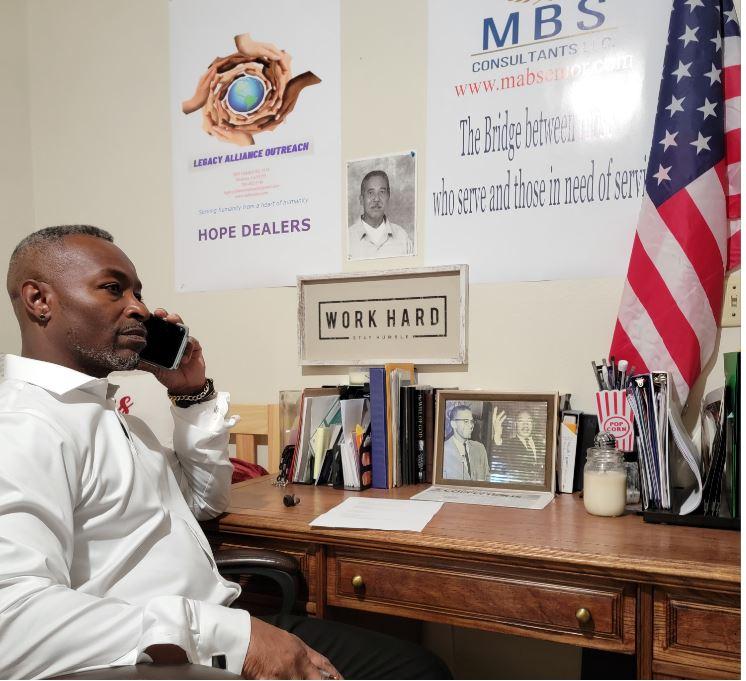Michael Baldwin Senior is a Modesto Community Advocate and Paralegal. This article is the second in a series on the challenges faced by current and former convicts in their quest to successfully reenter society. It was written in collaboration with Tom Portwood.

April 7, 2021 is a day I’ll never forget, because just as I was getting out of bed, one of my former parole agents called me and gave me the big news I had been anxiously awaiting — that I had been granted early release from my parole by a full three years.
When I got off the phone that morning, I couldn’t contain myself. I rushed over to the parole office for confirmation. As I started to drive away, I suddenly stopped my car, jumped out, and ran down the street for a bit, screaming out of sheer joy! Yes, freedom is a precious thing, and only those who have lost it completely, as I did, or never experienced it, can fully appreciate how liberating it can be to regain it, or taste it for the first time.
For me, it was also a moment of reflection, and I reminded myself that it was only another day in the journey that I started on all those years before in one California Department of Corrections and Rehabilitation (CDCR) prison after another — that quest to reclaim my life and be of service to my fellow inmates and the larger community was about to go to the next level, and on every level there will be a new devil — something to test my stamina and endurance and make me dig deeper.
In the first article in this series, I wrote of the need to overhaul the rehabilitation programs within the CDCR system, adding that more often than not it’s the inmate population that’s providing the most viable rehabilitation services, that a proactive inmate can make a big difference by enrolling in a worthwhile regimen of programs that can set him on the path to self-awareness and reform. That’s the starting point.
The next challenge is preparing for the parole board, and that process often takes years and involves further soul-searching and finding insight into and remorse for one’s crimes and attaining a level of real accountability. The commissioners usually want you to have some level of vocational skill, and a relapse prevention plan, which addresses how you are going to make sure that you don’t fall into the same bad behavior or back onto a drug. But once you’ve been granted parole, that’s when the real work begins. Now you’re on your own, maybe for the first time in fifteen or twenty years. And that’s scary.
Having some support – from your own family or friends or through a transitional program – as soon as you walk out the prison gates is critical. It’s not something that everyone always has in place, but having some type of support before you leave can pave the way for your optimum success. If you don’t have that support, it’s as if you’ve been thrown out into a foreign land and you don’t speak the language.
That first day can be shocking and exhilarating, all at the same time. Little everyday things, like buying bubblegum or walking into a Walmart and seeing all those people, can trigger powerful emotions. Suddenly, it can seem like too many people, too many options, too much going on.
This is when the formerly incarcerated are at their most vulnerable: those first 24 hours, especially if they haven’t a support system. The two hundred dollars CDCR gives them on their way out won’t last long if they haven’t a plan and even with a plan two hundred dollars will not provide much. Without a plan or some sort of support, they can find themselves living on the streets fairly quickly and when you’re on the streets – as they say, “when in Rome do as the Romans do.” Returning to custody can be very easy in those circumstances.
Meeting with your parole agent and beginning to build a constructive relationship is another top priority, of course, and typically occurs between 48 and 72 hours after release. Parole agents are only human, and there are definitely some who are not as stellar as others. But there are many phenomenal agents, and they want to see you succeed. They will work hard, but not harder, than you to get you to that success. I was blessed to have six extraordinary men who were my parole agents and there was one woman as well, and each one of them has been outstanding in helping me to get to the place where I am today.

Some formerly incarcerated individuals may have a strong family network, and they may not require a transitional program, but I believe that even if you have a strong family network that the transitional program is a healthy way to rehabilitate successfully out of prison, especially if you have served more than fifteen to twenty years. There are some aspects of prison that you have to shed (internally and in some behaviors) that may be best let go of away from the family unit.
There are quite a few transitional housing programs for parolees, but not enough. Also, some of them are located in areas that many of us may not want to parole into. We’ve been there, done that, and we don’t want to go back to that type of environment. If at all possible, you want to carefully pick the area you would prefer to parole into, though not everyone has that option. Housing, generally, is a major challenge, not just for the formerly incarcerated, but for all of us. Rent Café reports that rentals in Modesto now average $1,414.
The first 30 days is the hardest part, and then, beyond that, the transition begins to smooth out in most cases.
One of the biggest challenges is trying to find a job. Even before the pandemic, reconnecting to the workforce has always been particularly difficult for the formerly incarcerated. The Prison Policy Institute reported in 2018 that that the unemployment rate among the formerly incarcerated was over 27%.
Usually the best way to find a job once you’ve gotten out is through word of mouth, or through relationships that you already have. I’m a firm believer in networking and building relationships. Your “Net-work is your Net-worth.” We’re arrive at our destiny on the vehicle of relationships. For me, I came out looking to volunteer, making myself available to be of service to the community. I was trying to be the support I myself needed. I was trying to fill gaps that in many cases no one else could see but me. You have to have an eye for serving to see these spaces.
These days, jobs are typically listed online, but most former inmates are not going to have the money to have a computer, and many of those on parole may not know how to use a computer. That type of information or training is going to have to come from their social support network, or from a transitional program.

I usually tell my friends to frequent AA and NA meetings immediately. During the pandemic, those meetings were available only virtually, but perhaps now that will gradually change. I encourage the formerly incarcerated to frequent these meetings and to stand up and say their names, say where they’ve been, and talk about their circumstances. Most people in recovery are looking for an opportunity to serve, to give a hand up to somebody. By telling people about your story, you’re exposing yourself to the help that’s available at those meetings.
The criminal elements that former convicts had associated with earlier are often still out there, sometimes with new tricks up their sleeves. They’ve found new ways to hustle, because they always do. For myself, I haven’t had to wrestle with that a whole lot, but this is another barrier that’s frequently being thrown in the face of the formerly incarcerated. That pressure can show up immediately — especially if you find yourself struggling with finances.
I’ve been able to push away all the offers just by staying true to who I am, and that’s what I encourage all my friends to do — to just remember who you are now, and what’s at risk should you relapse. They left the light on for you in CDCR so you can’t forget what it felt like to be in that cell, and how you were willing to do whatever it took to be free. Now the rubber meets the road!
Reintegration back into the family can be a struggle, too, and of all the challenges faced by the formerly incarcerated this’ll be the one that may take the most time and cause the greatest heartache.
Apologizing is a very important part of the 12-step process; and even outside of the family dynamic, it’s an important part of transitioning back into society. I believe accountability is what propels us in our lives. Taking that ownership for my past mistakes has allowed my family to engage with me. I encourage my friends to make amends. A friend of mine was recently very upset because his son wouldn’t let go of his anger toward him. And I told him, “Hey, you can’t control how that’s going to come out. Your responsibility is to simply leave the bridge intact, so when that family member needs to cross back over the bridge it’s still there. You need to realize that he’s just hurt and right beneath that hurt is probably deep sadness, and right underneath that is love. Your responsibility is just to hold space for him – to let him vent any way he can.”
And leaving that bridge intact is the key – not just to rebuilding relationships within the family, but in just about every other aspect of a formerly incarcerated individual’s life. I know, because I continue to live that life myself. I’m here in the community for those who want to talk about what’s going on with them. I can be reached at Legacy Alliance Outreach, or visit my website: www.mabsenior.com. My email is:
[email protected]

Hello, again, Michael Baldwin Sr, we were waiting patiently to hear from you.
Your posts are full of wisdom and guidance…
Especially wise is your path, as shared: “I was trying to be the support I myself needed. I was trying to fill gaps that in many cases no one else could see but me. You have to have an eye for serving to see these spaces.”
Some things are invisible, outside of experience. Not saying people need certain types of experiences in order to see. Am saying we are granted gifts, eyes to see, ears to hear, charity to give…
You are “here in the community for those who want to talk about what’s going on with them.” We certainly need you here in this community, talking about what’s going on. And listening…
Looking forward to hearing more about your successes and about the successes of those who come along side you to be healed and heal.
The LORD bless you and keep you;
The LORD make His face to shine upon you and be gracious to you;
The LORD lift up His countenance upon you and give you peace;
So shall they put my name upon the people of Israel, and I will bless them.”
Thank you for your faithful and thoughtful service.
In all good faith,
Excellent article ! Very informative. You addressed small and large issues that many would not recognize. Thank you for being transparent which encourages others to do so. You are truly an Amazing person Mr. BALDWIN…AND WE ARE BLESSED TO HAVE YOU IN OUR COMMUNITY.
I’m so grateful to God my Brother. I am so very proud of you 😘
Michael:
Sharing your personal thoughts/lessons inspire all who read. Thanks. I hope that you will soon OK a video interview for us to broadcast on MYTV26.
– Richard Anderson
Michael,
What more can be said of a man who didn’t let the negativity get the best of him and instead is making a truly positive contribution to society. By helping others “pay it forward” you are a true inspiration.
Continued blessings !!!
Michael Baldwin Senior’s poignant article sheds light on the daunting challenges faced by formerly incarcerated individuals as they strive to reintegrate into society. His personal journey and insights into the struggles of transitioning out of prison evoke empathy and understanding. Baldwin emphasizes the importance of support systems, accountability, and perseverance in navigating the complexities of life after incarceration. His words resonate deeply, offering hope and guidance to those embarking on similar paths. This article not only educates but also inspires compassion and empathy towards individuals seeking redemption and a second chance. Great job on articulating such crucial information with clarity and emotion!